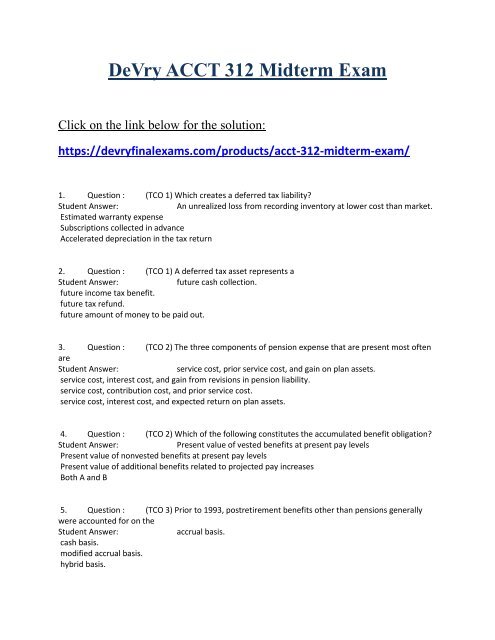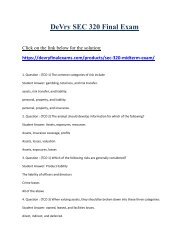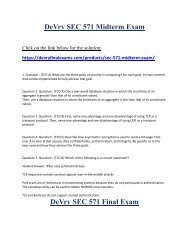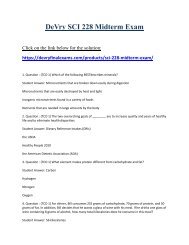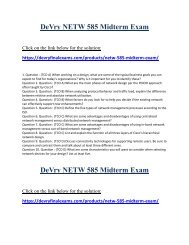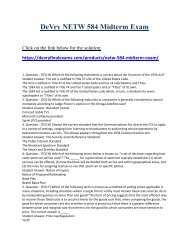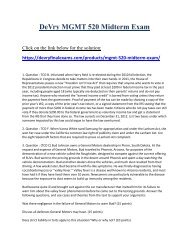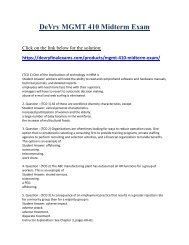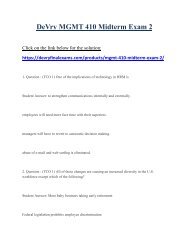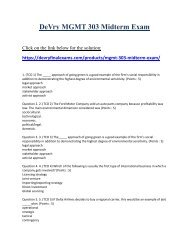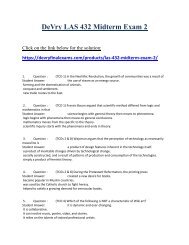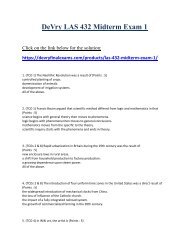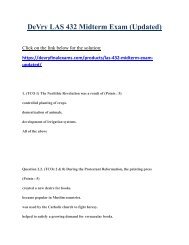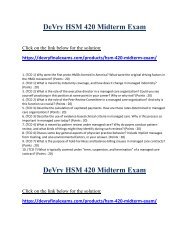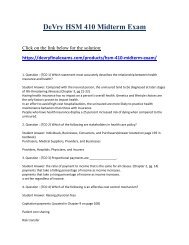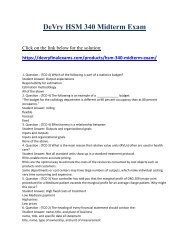ACCT 312 Midterm Exam
Create successful ePaper yourself
Turn your PDF publications into a flip-book with our unique Google optimized e-Paper software.
DeVry <strong>ACCT</strong> <strong>312</strong> <strong>Midterm</strong> <strong>Exam</strong><br />
Click on the link below for the solution:<br />
https://devryfinalexams.com/products/acct-<strong>312</strong>-midterm-exam/<br />
1. Question : (TCO 1) Which creates a deferred tax liability?<br />
Student Answer:<br />
An unrealized loss from recording inventory at lower cost than market.<br />
Estimated warranty expense<br />
Subscriptions collected in advance<br />
Accelerated depreciation in the tax return<br />
2. Question : (TCO 1) A deferred tax asset represents a<br />
Student Answer:<br />
future cash collection.<br />
future income tax benefit.<br />
future tax refund.<br />
future amount of money to be paid out.<br />
3. Question : (TCO 2) The three components of pension expense that are present most often<br />
are<br />
Student Answer:<br />
service cost, prior service cost, and gain on plan assets.<br />
service cost, interest cost, and gain from revisions in pension liability.<br />
service cost, contribution cost, and prior service cost.<br />
service cost, interest cost, and expected return on plan assets.<br />
4. Question : (TCO 2) Which of the following constitutes the accumulated benefit obligation?<br />
Student Answer:<br />
Present value of vested benefits at present pay levels<br />
Present value of nonvested benefits at present pay levels<br />
Present value of additional benefits related to projected pay increases<br />
Both A and B<br />
5. Question : (TCO 3) Prior to 1993, postretirement benefits other than pensions generally<br />
were accounted for on the<br />
Student Answer:<br />
accrual basis.<br />
cash basis.<br />
modified accrual basis.<br />
hybrid basis.
6. Question : (TCO 4) Which of the following transactions decreases retained earnings?<br />
Student Answer:<br />
A property dividend<br />
A stock dividend<br />
A cash dividend<br />
All of the above<br />
7. Question : (TCO 4) When a property dividend is declared, the reduction in retained<br />
earnings is for<br />
Student Answer:<br />
the book value of the property on the date of declaration.<br />
the book value of the property on the date of distribution.<br />
the fair value of the property on the date of declaration.<br />
the fair value of the property on the date of distribution.<br />
8. Question : (TCO 5) Executive stock options should be reported as compensation expense<br />
Student Answer:<br />
using the intrinsic value method.<br />
using the fair value method.<br />
using either the fair value method or the intrinsic value method.<br />
only on rare occasions.<br />
9. Question : (TCO 5) Our company granted options for 2 million shares of its $1 par common<br />
stock at the beginning of the current year. The exercise price is $35 per share, which was also the<br />
market value of the stock on the grant date. The fair value of the options was estimated at $9 per<br />
option. If the options have a vesting period of 5 years, which would be the balance in Paid-in Capital –<br />
Stock Options 3 years after the grant date?<br />
Student Answer:<br />
A credit of $10.8 million<br />
A credit of $18 million<br />
A debit of $70 million<br />
A debit of $3.6 million<br />
10. Question : (TCO 6) Which of the following is not a potential common stock?<br />
Student Answer:<br />
Convertible preferred stock<br />
Convertible bonds<br />
Stock rights<br />
Participating preferred stock<br />
11. Question : (TCO 6) When computing diluted earnings per share, which of the following will<br />
be omitted from the calculation?<br />
Student Answer:<br />
The weighted average common shares<br />
The effect of stock splits<br />
Dividends paid on common stock<br />
The number of common shares represented by stock purchase warrants<br />
12. Question : (TCO 1) Please describe permanent differences and provide three examples.
13. Question : (TCO 2) Please describe defined-contribution plans. What is an example? Who<br />
bears the risk? Who typically contributes to these plans?<br />
14. Question : (TCO 4) What are the two ways for a company to reacquire stock? Please also<br />
discuss when a company reacquires stock and whether there is a difference between the amount the<br />
shares were originally sold for and the cash paid to buy the shares back.<br />
15. Question : (TCO 5) What is FASB’s stance on companies recording compensation expense<br />
for stock option plans? What method is preferable? What is the journal entry to record compensation<br />
expense?<br />
DeVry <strong>ACCT</strong> <strong>312</strong> <strong>Midterm</strong> <strong>Exam</strong><br />
Click on the link below for the solution:<br />
https://devryfinalexams.com/products/acct-<strong>312</strong>-midterm-exam/


